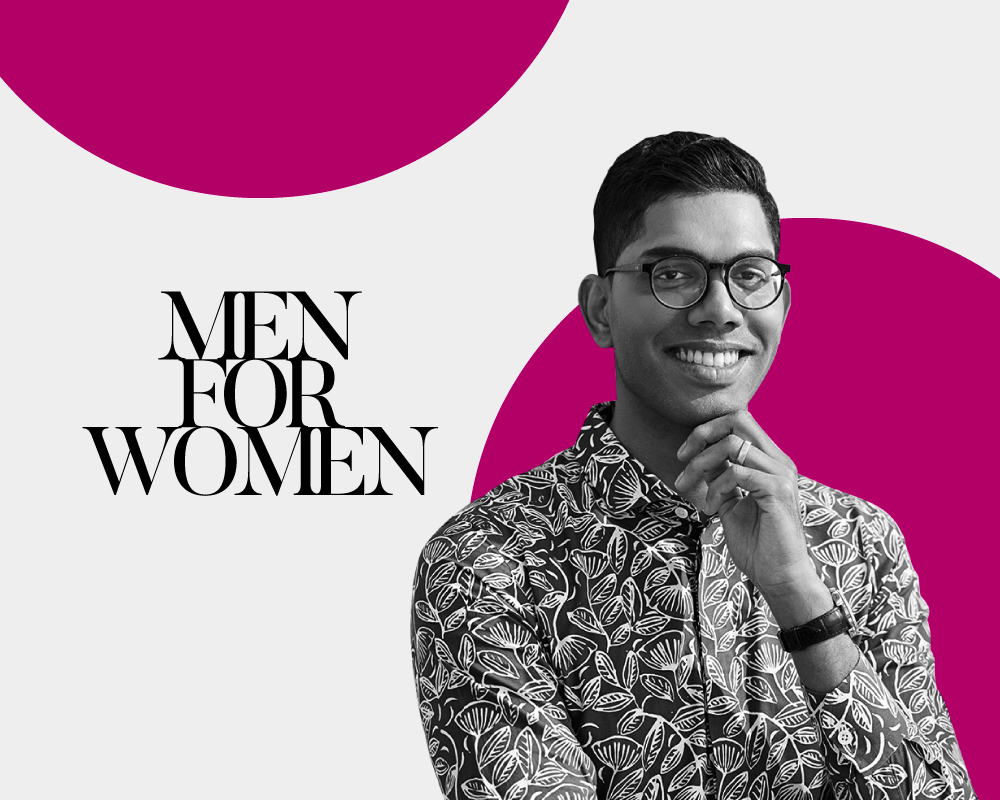What role do men have in the fight for women’s empowerment and gender equality? How can males participate in the uphill climb towards better female representation? Why is male allyship important? To answer these questions this International Women’s Day, we ask three male advocates what being an ally looks like for them.
As a chief executive with over 18 years of experience in senior leadership and investment roles in Europe and Asia, Jalil Rasheed, Group CEO of Berjaya Corporation, has seen concrete evidence that links diversity, equity and inclusivity (DEI) to business performances.
“This rings true as a harmonious workplace carrying positive values will increase consumers trust and belief in the brand or organization, which in turn will impact the bottom line positively in the long run,” he reasons.
As a father of two young girls, this is a cause that takes on a personal agenda.
He says, “It is a subject that is close to my heart because I am acutely aware of the challenges my daughters are likely to face so I hope to make it a more equitable environment. My measure of success is that one day we never have to speak about DEI as it has become a way of life.”
Beyond just the act of hiring more women, Jalil counts proper DEI efforts as including equal opportunities in all foundational areas from pay rates, types of roles, representation in leadership and management teams to career-building opportunities, amongst others. This is important because only then can organisations attract and retain good talents.
Diversity also significantly improves productivity. “Diversity in opinion, perspectives and approaches results in more thought-provoking discussions which in turn allow for a more holistic decision- making within the organization, he tells.
As the topic of women empowerment and conversations on DEI pick up once more with the dawning of International Women’s Day, this is how Jalil seeks to contribute to the arena with his experience and influence as a proud male ally.
Walking the Talk
Jalil started with the areas he has authority to make change, Berjaya Corporation
He took a top-down approach, ensuring that Berjaya Corporation’s board and senior manament are well represented by women. Today, the corporation’s board members encompass 57% women. Out of its 9,700 employees, 49% of that are women. They directly service the corporation’s customer demographic that includes a high percentage of women, namely 84% in the case of Cosway’s customers.
“It is important for us to set the tone on the importance of DEI agenda at the decision-making level to ensure it gets cascaded all the way down and across our subsidiaries,” Jalil shares.
On top of just putting them there, Jalil seeks to kepe them there by ensuring they are properly taken care of. He does this by setting up the corporation’s Justness, equity, Diversity and Inclusivity (JEDI) Programme, that overlooks anti-harassment and employee rights, ensures inclusive work space and practices and bias-free people processes and systems.
Jalil adds, “I am also looking at having DEI metrices incorporated into individuals and organizational performance evaluation in the coming year.”
Getting there has not been easy. Jalil acknowledges that some bias are deeply ingrained as much as we need to work towards overcoming them. For him, it is unconscious bias that he pays extra attention to.
“Unconscious bias remains one of the biggest challenges to me. We subconsciously take certain actions based on facts or experiences from the past which can be damaging to the current situation at hand. Common biases such as age, gender and looks should not be part of any conversation especially during hiring process. It is crucial to eliminate bias at every step so that everyone feels a sense of belonging,” he reflects.
He is trying to overcome it by talking more about it. “Best way is through dialogue and discussion. Better culture starts with better conversations, and I am slowly inculcating the culture into my organization.”
His steps in embedding this into practice is by continuously revisiting people-related processes to reflect DEI, beginning with recruitment all the way to performance management.
Firmwide education is also on his agenda. “Many hiring managers would have biasness that is impossible to eliminate so we need to acknowledge and address them. Some quick-win actions can also be taken immediately such as eliminating photo from CVs, having a gender-neutral interview panel and not determining compensation based on a job’s applicant salary history solely.”
Men for diversity, equity and inclusivity
Being a male ally is a natural decision for Jalil and he hopes to encourage more to get on board. After all, women empowerment does not, and should not, end with the women doing all the work.
“It is a major culture change to promote inclusivity at every level of society –home, work, community,” he opines. “It is one of the many catalysts in pushing through the DEI agenda especially in workplace. This is important as equality in workplace is one of the benchmarks of a progressive country which translates back into the country’s economic growth.”
For those unsure of where to start, Jalil recommends baby steps, beginning with one’s own immediate circle. “Men can be mentors and take on mentees. I know this is usually done by those in leadership positions but those who are not should also start doing it. This will create more awareness on the challenges faced by their women peers at work so we can bring out the best in every individual and set a level playing field so that everyone has the right pathway to thrive.”
To widen that circle thereafter, it is important to have open dialogues. “Ideas around collaboration, respect, access, and safety need to be rigorously rejigged and openly discussed across the organisation,” he expounds.







